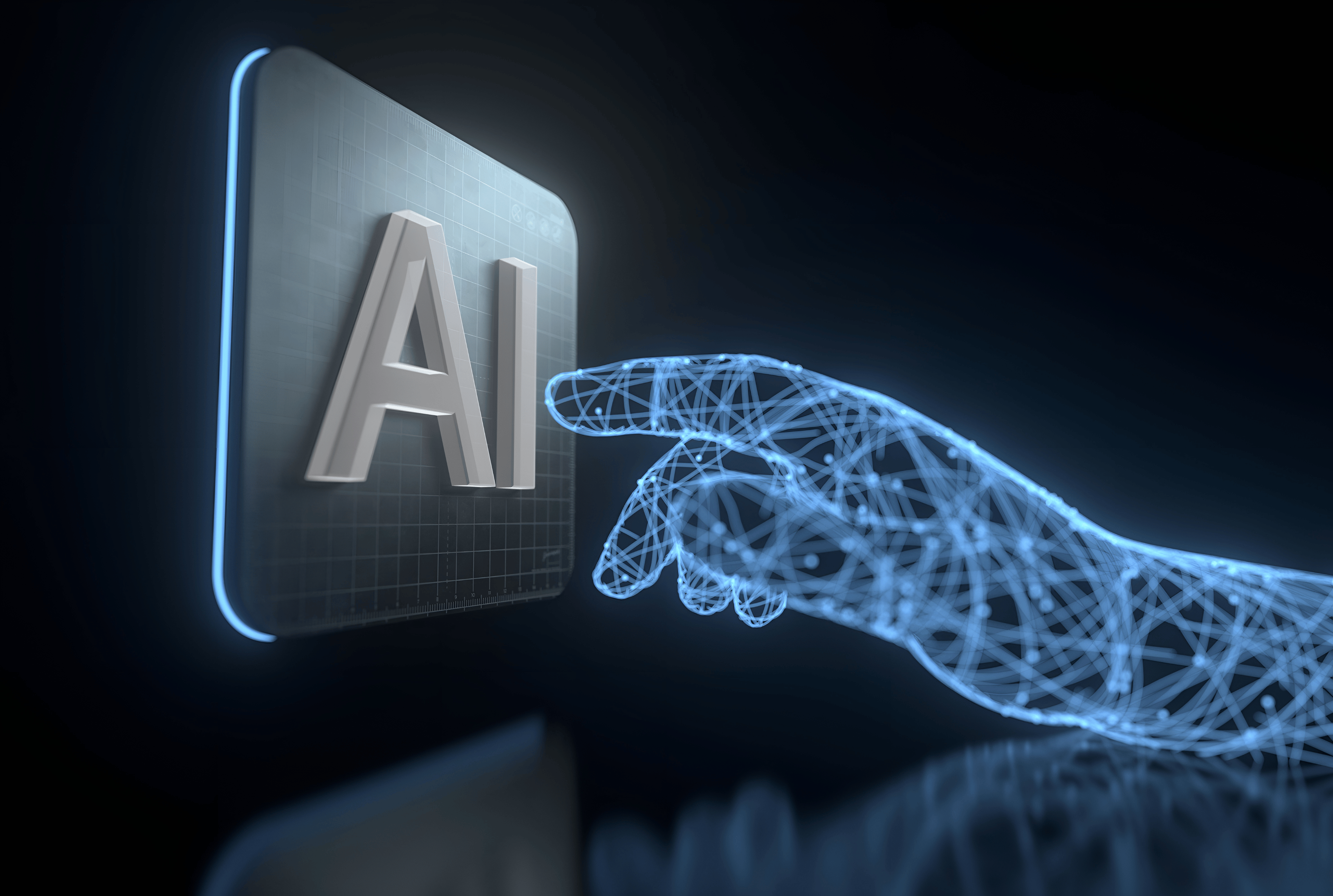



What Is Artificial Intelligence (AI)? A Beginner’s Guide to Understanding AI
Artificial Intelligence, or AI, might sound like a complex concept, but it’s a technology that’s becoming increasingly woven into our daily lives. Whether you’re using your smartphone, searching the web, or asking your voice assistant for the weather forecast, AI is working behind the scenes to make these interactions possible. But what exactly is AI? Let’s break it down in simple terms that everyone can understand.
At its core, Artificial Intelligence (AI) refers to the simulation of human intelligence in machines that are programmed to think, learn, and make decisions. These systems are designed to perform tasks that typically require human intelligence, such as understanding language, recognizing patterns, solving problems, and even making decisions.
Imagine a computer that can learn and think like a human, but with the ability to process information much faster and more accurately. AI systems are trained to “learn” from data, recognize patterns, and make decisions with minimal human intervention.
The "artificial" in Artificial Intelligence signifies that this form of intelligence is created by humans and not naturally occurring. Unlike humans, who use their brains to process information, AI relies on algorithms—sets of rules and instructions that guide the computer’s actions.
One of the most fascinating aspects of AI is its ability to learn, a process often referred to as machine learning. Instead of being explicitly programmed to perform every task, machine learning algorithms allow AI to learn from data. For example, by analyzing thousands of images of cats, an AI can learn to recognize a cat in a new picture it has never seen before.
AI is not a one-size-fits-all technology; it comes in various forms and levels of complexity. Here’s a breakdown of the main types:
Narrow AI is designed to perform a specific task, and it’s the type of AI that we encounter most often today. Examples include:
Narrow AI is highly effective within its domain but can’t perform tasks outside of its specific purpose. For example, while Siri can tell you the weather, it can’t help you cook dinner.
General AI is a more advanced form of AI that can perform any intellectual task a human can do. It remains a theoretical concept and hasn’t yet been realized. If developed, General AI would have the ability to understand, learn, and apply knowledge across a wide range of tasks, much like a human being.
Superintelligent AI would surpass human intelligence in all aspects, from creativity to problem-solving skills. This type of AI is still purely speculative and often explored in science fiction. The idea is that a superintelligent AI would be smarter, faster, and more capable than the best human minds.
AI is not just a futuristic concept; it’s already a part of our daily lives. Here are some ways AI is being used today:
Services like Apple’s Siri, Google Assistant, and Amazon’s Alexa are powered by AI. These virtual assistants use natural language processing (a branch of AI) to understand and respond to your voice commands, making everyday tasks more convenient.
When you type a query into Google, AI algorithms work behind the scenes to find the most relevant results. AI also helps understand the intent behind your search, even if you make a typo.
AI algorithms are what determine the content you see on platforms like Facebook, Instagram, and Twitter. By analyzing your interactions, AI helps personalize your feed to show you content you’re most likely to engage with.
In the medical field, AI is being used to diagnose diseases, suggest treatments, and even predict patient outcomes by analyzing vast amounts of medical data. This is making healthcare more accurate, efficient, and accessible.
Self-driving cars use AI to navigate roads, avoid obstacles, and make decisions in real-time. Companies like Tesla are at the forefront of this technology, which could one day revolutionize the way we travel.
AI offers numerous advantages that have the potential to significantly enhance various aspects of our lives:
AI can handle repetitive tasks with speed and precision, allowing humans to focus on more creative and strategic activities.
By analyzing large amounts of data quickly, AI can help make better, more informed decisions, whether it’s in business, healthcare, or everyday life.
AI can tailor experiences to individual preferences, from recommending your next favorite song to suggesting personalized product offerings, making interactions with technology more satisfying.
While AI holds great promise, it’s not without its challenges and ethical dilemmas. Here are some concerns:
As AI systems become more capable, there’s a growing concern that they could replace human jobs, especially those that involve repetitive tasks.
AI systems often rely on large amounts of data to learn and improve, raising concerns about how this data is collected, stored, and used. Ensuring data privacy is a critical issue.
AI can make decisions with significant consequences, such as in autonomous vehicles or healthcare. It’s essential to ensure these decisions are made ethically and fairly, with human oversight where necessary.
AI is still evolving, and its future is full of possibilities. As technology advances, we can expect AI to become even more integrated into our lives, solving complex problems and possibly even sparking new forms of creativity.
In the future, AI could revolutionize education by personalizing learning experiences for students. Imagine AI that can adapt lessons to each student’s learning style, providing customized feedback and support.
AI could play a pivotal role in predicting illnesses before they occur, offering personalized treatment plans, and even assisting in surgeries with robotic precision. This could lead to a new era of preventative healthcare.
AI is already being used to compose music, create art, and write stories. As these systems become more advanced, we may see AI-generated works that rival human creativity, opening up new possibilities in art and entertainment.
AI itself is not inherently dangerous, but the way it is used can be. Responsible development and ethical guidelines are essential to ensure AI benefits society as a whole.
AI can perform many tasks more efficiently than humans, but it’s unlikely to replace us entirely. Instead, AI will likely augment human capabilities, allowing us to focus on more complex and creative tasks
.
Not at all! AI is becoming more accessible, and there are plenty of resources available to help anyone learn about it, regardless of their technical background.
There are many free courses, tutorials, and articles online that can help you get started with AI. A good starting point is to understand how AI works in everyday applications like search engines or virtual assistants.
This is more a topic for science fiction than reality. While AI will continue to play an increasingly important role in our lives, the idea of AI taking over the world is far-fetched.
AI impacts your daily life in many ways, from filtering spam emails to recommending shows on Netflix, and helping you navigate traffic with GPS. Even if you don’t always see it, AI is constantly working to make your life easier.


Founded in 2015, BPM Tech Solutions started as a small venture with a big vision: to provide top-tier technical support and cybersecurity solutions to individuals and businesses. From our humble beginnings, we have grown steadily, thanks to our unwavering commitment to excellence and customer satisfaction.
Our success is built on a foundation of trust and reliability. We understand the importance of staying ahead in the fast-paced digital world, and we continuously update our knowledge and skills to provide cutting-edge solutions. Whether it's keeping your devices running smoothly or protecting your online identity, BPM Tech Solutions is dedicated to delivering the best possible outcomes for our clients.
ⓒCopyright 2024 BPM Tech Solutions . All rights reserved




| 🔒 100% Secure Checkout | ✅ 30-Day Satisfaction Guarantee | 🛡️ Trusted by 1,500+ Seniors | 📞 24/7 Customer Support |

